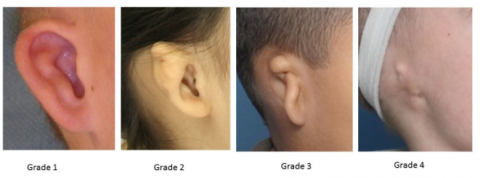Microtia

Congenital deformity where the pinna (external ear) is underdeveloped. A completely undeveloped pinna is referred to as anotia. Because microtia and anotia have the same origin, it can be referred to as microtia-anotia. Microtia can be unilateral (one side only) or bilateral (affecting both sides).
Microtia occurs in 1 out of about 8,000–10,000 births. In unilateral microtia, the right ear is most commonly affected. This disease is visible on the 20-weeks ultrasound but for shure at birth.
Microtia can be a part of a complex spectrum of syndromes. Mostly common in a combination with a craniofacial syndrome. It can also occurs on its own.
It may occur as a complication of taking accutane (isotretinoin) during pregnancy.
Rib cartilage ear reconstruction was the first surgery to successfully treat microtia. The procedure typically requires two to four surgeries, at best when patients are between the ages of 10 and 16.
MEDPOR® technique is also an accepted standard for surgical microtia treatment. With this technique a new ear framework is created using biocompatible polyethylene.
Microtia Q17.2 (congenital) (external ear)
Oculo-Auriculo-Vertebral Spectrum (Goldenhar Syndrome)
In the total spectrum of OAVS are many syndromes. One of them is Goldenhar Syndrome (GHS). Goldenhar syndrome is a rare congenital defect in the...
Treacher Collins Syndrome
Treacher Collins Syndrome is a genetic disorder characterized by hypoplasia of facial bones (mandible, maxilla and cheek bone), antimongoloid slant of palpebral fissures, coloboma of...
